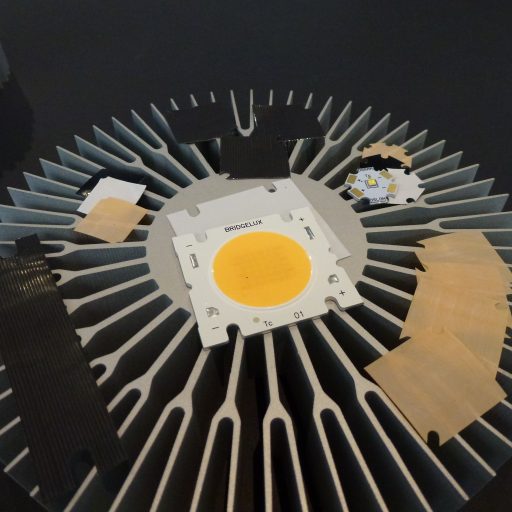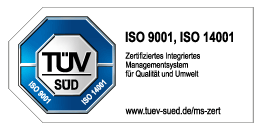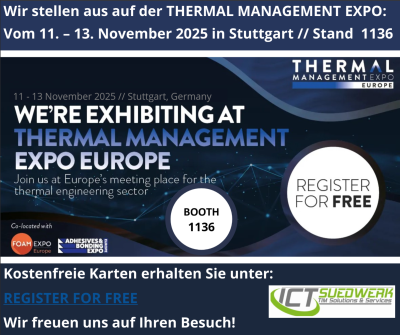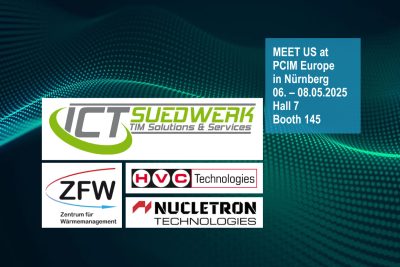06 Thermally Conductive Phase-Change Materials
Silicone-Free, Anisotropic, High-Performance Interface Materials
Thermally Conductive Phase-Change Materials
PRODUCT DESCRIPTION
Thermally conductive phase-change materials (PCM), manufactured in the form of thin films or foils or compounds, electrically insulating or non-insulating are ideal T.I.M.s for applications that require strongly
reduced thermal contact resistance between the metal surfaces
of the power semiconductor and the heat sink.
We offer our customers a range of 3 product variants:
Type 1:
The electrically insulating PCM product range in composed of a very thin polyimide carrier film – the thickness of which is optional – coated, on both sides, with silicone-free thermally conductive wax. This composition merges the excellent dielectric and mechanical properties of polyimides with the thermal capacities of heat-conductive wax. The PC thermally conductive wax is available both in a silicone-free version and in a silicone-
based one. A lightly adhesive PC thermoconductive wax variant completes this product range. Phase-change temperature of these materials is at around 60°C.
Type 2:
This electrically non-insulating PCM product range consists of a very thin aluminium foil – the thickness of which is optional – which is also coated with
thermally conductive wax on both sides. As fillers, either ceramic materials
or highly thermoconductive graphite are used. Volumetric expansion of the
thermally conductive wax, above phase-change temperature, by around 15-20% and the resulting wet-out of the surfaces demonstrably minimizes thermal contact resistance to < 0,09 °C-inch²/W. Phase-change temperature of theses products is around 51°C.
Type 3:
This non-insulating PCM product range consists of PC freestanding thin films enriched with highly thermoconductive ceramic or graphite/graphene
particles without a carrier substrate. Beside the silicone-free variant, silicone-based PC freestanding thin films are also available.
This material range comes in diverse delivery formats – solid blocks (bars),
the ICT fill-up stick or in a syringe (tube). The latter two forms are excellently suited for small-batch production, for small surfaces or for servicing applications. Phase-change temperature of theses materials is around 45-51°C.
Comparison table
| Property | ICT-Ap60 | ICT-Dp60 | ICT-PC-Fillup-STICK | ICT-Ip50/60 | ICT-Up60 | ICT-Xp45 |
|---|---|---|---|---|---|---|
| Thermische Eigenschaften | ||||||
| Operating temperature | 0 °C | 0 °C | 0 °C | 0 °C | 0 °C | 0 °C |
| Thermally conductive | No | No | No | No | No | No |
| Thermal conductivity | 0.00 W/m*K | 0.00 W/m*K | 0.00 W/m*K | 0.00 W/m*K | 0.00 W/m*K | 0.00 W/m*K |
| Thermal resistance (inch² / 645,16mm²) | 0.052 .. 0.060 K/W | 0.120 .. 0.290 K/W | 0.008 .. 0.020 K/W | 0.009 .. 0.012 K/W | 0.78 .. 0.85 K/W | 0.014 .. 0.016 K/W |
| Thermal resistance (TO-3P / ca. 360mm²) | - | - | - | - | - | 1.67 °C/W |
| Elektrische Eigenschaften | ||||||
| Electrically conductive | No | No | No | No | No | No |
| Dielectric strength | - | 6000 kV (AC) | - | - | 7,1 kV (AC) | - |
| Dielectric breakdown voltage | - | 6000.00 kV/mm | - | - | - | - |
| Allgemeine Eigenschaften | ||||||
| Color | White | Orange (matte) | White|Graphite | Black | Yellow | Gray |
| UL flammability rating | - | 94 V0 UL | - | - | 94 VO UL | - |
| Material | - | - | PCM Interface compound Aufbau | - | - | Pure film | Compound Aufbau |
|
|
|
|
|
|
|
|





